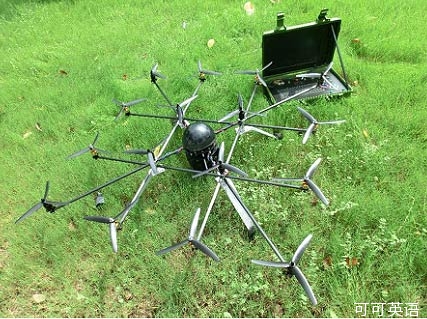(单词翻译:单击)

With eight bloodshot eyes fixed on a flying object, the toils of a two-year project were about to bear fruit.
四双布满血丝的眼睛注视着这架飞行器,两年的艰辛和汗水终于要结出硕果了。
It was Wang Hongyi’s first test flight of an unmanned aerial vehicle (UAV) designed and assembled with his teammates from the Aero-Sport Club at Shanghai Jiaotong University.
这架无人机由上海交大航模队的几名成员设计组装而成。作为成员之一,这是王弘毅首次对该无人机进行“试航”。
They had been working on the 16-propellered multicopter for countless nights and they couldn’t have been more nervous about the results.
为了这架“十六旋翼无人机”,他们辛勤工作,度过了无数个不眠夜;面对这一成果,没人比他们更紧张了。
Wang is a senior mechanical engineering and automation major. The 23-year-old never expected that after a successful lift off, their UAV would need another 200 test flights before coming even close to perfection.
王弘毅是就读于机械工程与自动化专业的大四学生。23岁的他从没料到,在“首飞”成功后,他们所研制的无人机还需要200次试飞才能达到近乎完美。
Despite the hard work, Wang says they are fuelled by their passion for technological perfection.
尽管这项工作着实不易,但王弘毅说对于精益求精的追求鼓舞着他们每一个人。
Accidental spot
纯属偶然
Wang has been a plane model maniac since he can remember. As a freshman, he spent two nights building a model aircraft and took it to the sports field just for fun. Wu Junqi, a lecturer at the school of aviation and astronautics and the coach of Shanghai Jiaotong University’s Aero-Sport Club, spotted Wang on his way to the canteen. Wu told Wang that the plane he had built was a “pre-Industrial Revolution one” – in other words, it was outdated.
自打记事以来,王弘毅就是个不折不扣的航模发烧友。上大一时,他用两个晚上制作了一架飞机模型并带着它去操场玩。在王弘毅拿着飞机模型去食堂的路上,上海交通大学航天航空学院讲师、该校航模队教练吴俊琦注意到了他。吴俊琦告诉王弘毅,他做的这个飞机模型属于“工业革命前的产物”,换句话说,它已经过时了。
“I was a little offended, so he took me to the Aero-Sport Club’s laboratory,” says Wang. He was immediately drawn to the cutting-edge equipment and decided to join the club.
王弘毅说:“我当时有点儿生气,所以他带我去了航模队的实验室。”到那儿以后,他立刻就被眼前的尖端设备所吸引,立马决定加入该社团。
The Aero-Sport Club gave full play to Wang’s strengths - information technology and physics, which are the pillars of making model aircrafts.
航模队为王弘毅提供了一个充分施展其才华的舞台。他所擅长的信息技术和物理知识是制作航模的支柱。
“I love IT and physics, and my way of loving them is constantly broadening my knowledge in these areas and using it to make a difference,” Wang says.
王弘毅说:“我热爱信息技术和物理。正是出于这份热爱,我不断扩充着这些方面的知识,并利用这些知识来创造革新。”
Lab geeks
实验室狂人
As a technology “geek”, Wang routinely spends most of his spare time in the laboratory.
作为一个科技“怪咖”,王弘毅经常将大部分业余时间花在实验室里。
“During vacations, I live in the laboratory and follow the same routine every day,” he says.
他说:“假期,我会住在实验室里,每天过着一成不变的生活。”
After getting up at 6 am, Wang starts his day by taking his aircraft for a test flight. Around 8 am he makes some adjustments to the plane and recharges its batteries. He takes the aircraft for another two-hour flight before lunch and then spends the whole afternoon in the laboratory making further adjustments and recharging the batteries. The last test flight is at 5 pm, after which Wang compares all the day’s test flight results.
每天早晨6点半起床后,王弘毅会试飞航模,以此开始自己的一天。8点左右,他会调整航模并为它充电。午饭前,他还会做两个小时的航模试飞;然后整个下午他都会待在实验室进一步调整模型,再给它充一次电。下午5点进行最后一次试飞后,王弘毅会对全天的试飞结果进行比较。
He usually goes to bed at 11:30 pm after reflecting on his day’s work and thinking about what adjustments need to be made the following day. But if Wang has a good idea, he postpones his bedtime to 2 or 3 am.
他通常晚上11点半才睡觉,之前,他会总结自己一天的工作并思考第二天需要做出哪些调整。但是如果王弘毅想到一个好点子,他会工作到凌晨两三点才去睡。
“The longest time I’ve spent continuously going to the laboratory is one and a half months,” he says.
他说:“最长的一次,我曾经连续在实验室里待了一个半月。”
“He loves what he’s doing, so he can bare the monotony and loneliness of doing research that others seldom have the persistence to carry out,” says coach Wu. “Sometimes he calls me at 10 or even 11 pm just to discuss technical problems,” he says.
吴俊琦教练说:“王弘毅热爱自己的工作,所以他可以忍受实验的孤独与单调,很少有人能做到持之以恒。有时,他晚上10点,甚至11点会给我打电话,只为了探讨一些技术难题。”
Never satisfied
永不满足
When Wang and his teammates were building the 16-propellered UAV, they lived together in the laboratory. “We tried to spend as much time together as possible because there were thousands of problems that needed to be tackled,” Wang says. They didn’t even have time to celebrate when the first test flight of the multicopter went well. “We needed to list the problems that occurred during the flight and analyze them to find solutions,” he says.
当王弘毅和组员们制作“十六旋翼无人机”时,他们一起住在实验室里。王弘毅说:“我们尽可能多地待在一起,因为我们有成千上万的问题需要解决。”他们甚至没时间去庆祝飞机“首航”成功。“我们需要记下飞行过程中出现的问题,加以分析,最终找到解决方法。”他说。
The team stuck to their routine even after their work caught much attention at the Challenge Cup, which is considered an Olympic event among science and technology students.
即便是他们的发明在被誉为“理工科生奥林比克”的“挑战杯”比赛中获得极大的关注,这支团队仍然按部就班地从事着日常工作。
“Our multicopter isn’t finished yet, but there are many design projects and people with similar interests waiting for me,” Wang says. “A 16-propellered UAV is just the beginning, not the end of my aircraft journey.”
“虽然我们的无人机尚未完工,而很多的设计项目和一些志同道合的朋友在等着我,”王弘毅说,“十六旋翼无人机只是一个开始,而不是我航模之旅的终点。”


